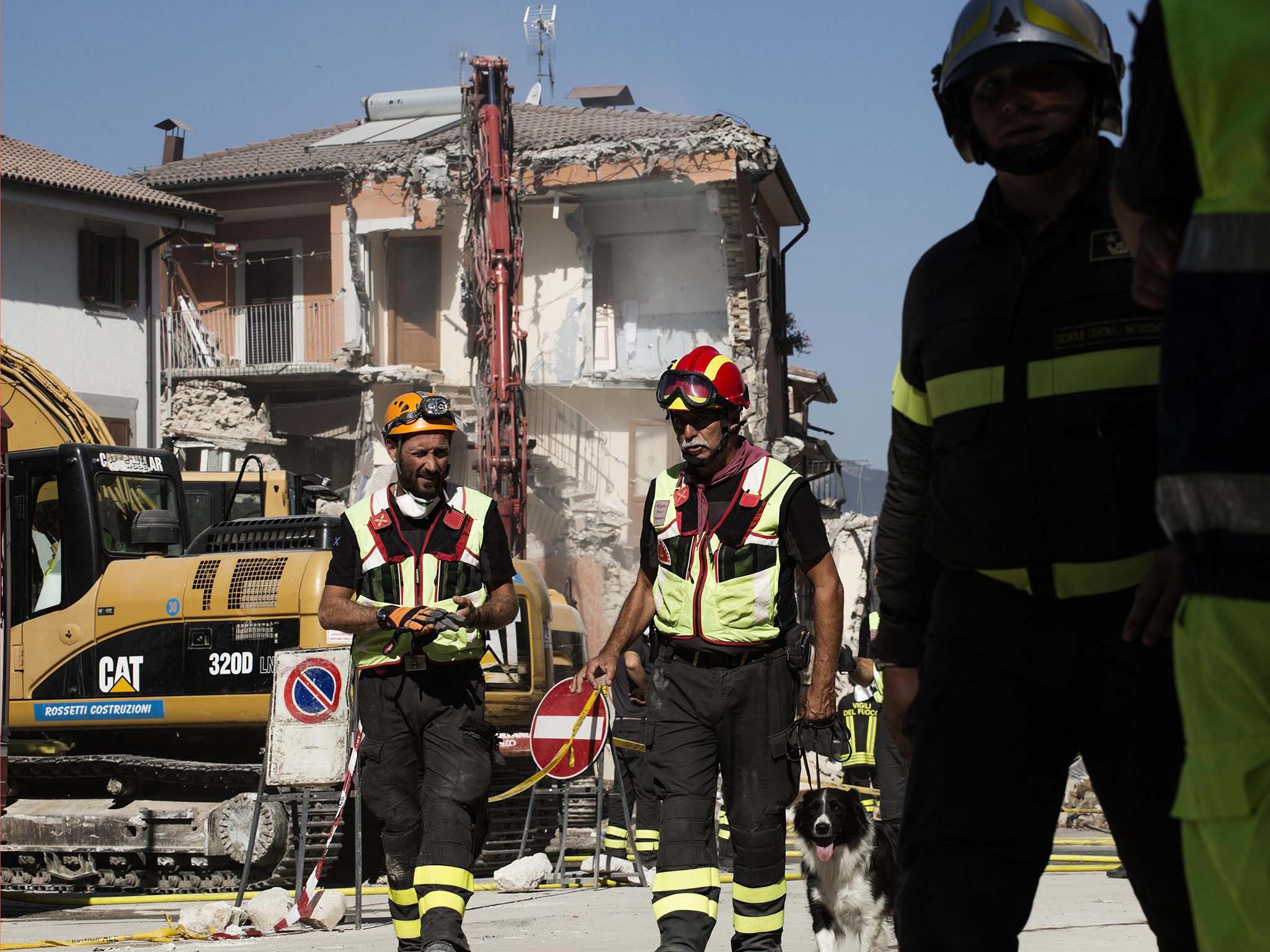Italy earthquake: More bodies found buried in rubble five days later
Up to 10 people are still believed to be missing

Your support helps us to tell the story
From reproductive rights to climate change to Big Tech, The Independent is on the ground when the story is developing. Whether it's investigating the financials of Elon Musk's pro-Trump PAC or producing our latest documentary, 'The A Word', which shines a light on the American women fighting for reproductive rights, we know how important it is to parse out the facts from the messaging.
At such a critical moment in US history, we need reporters on the ground. Your donation allows us to keep sending journalists to speak to both sides of the story.
The Independent is trusted by Americans across the entire political spectrum. And unlike many other quality news outlets, we choose not to lock Americans out of our reporting and analysis with paywalls. We believe quality journalism should be available to everyone, paid for by those who can afford it.
Your support makes all the difference.Rescuers believe they have found more bodies buried deep in the rubble of the ruined town of Amatrice, five days after a devastating earthquake struck central Italy, killing at least 290 people.
Residents of the hill town estimated that up to 10 people were still missing and emergency services said they had located three corpses in Amatrice's Hotel Roma, which, like much of the historic centre, was wrecked by Wednesday's quake.
Deputy Mayor Gianluca Carloni said his uncle's body had still not been recovered from the hotel, which was particularly busy at this time of year because of a food festival.
“It is absolutely vital to finish as soon as possible this initial (search) phase to make sure that there are no more bodies under the rubble,” he said.
Museums across Italy donated proceeds from their ticket sales on Sunday to help the rebuilding effort, while top flight soccer teams held a minute's silence before their weekend matches out of respect for the victims.
Pope Francis led prayers for the dead in his weekly address in St Peter's Square in Rome, saying he wanted to go to the earthquake zone to bring comfort to the survivors.
“Dear brothers and sisters, as soon as it is possible, I hope to come and visit you,” he said.
Priests in the quake zone held their regular Sunday services in large tents. Amatrice's municipal website said the town had 100 churches, but every one was damaged by the disaster and many would have to be demolished.
FALLEN MASONRY
With aftershocks continuing to rattle the region, including a magnitude 4.4 quake centred on the nearby city of Ascoli Piceno, residents were still struggling to absorb the disaster.
“It took me 20 years to get my house, and then, in just 10 seconds, it was gone, like so many others,” said Ascenzio Attenni, who lived in the hamlet of Sant'Angelo outside Amatrice, where eight people died.
“We have to thank God that we are alive,” he said, before breaking down in tears.
Rescue operations in most of the area were halted two days ago, but teams were still combing Amatrice, which is 105 km (65 miles) east of Rome. The fire service said it was trying to remove some of the fallen masonry at the Hotel Roma and create a safe path to retrieve the three bodies as soon as possible.
The Civil Protection Department lowered the official death toll on Sunday to 290 from a previously given 291. A number of foreigners were among the dead, including 11 Romanians, the foreign ministry in Bucharest said.
Many Romanians work in Italy and Bucharest said 14 of its nationals were still unaccounted for.
Italy has promised to rebuild the shattered communities and has said it will learn from the mistakes following a similar earthquake in the nearby city of L'Aquila in 2009, where much of the centre is still out of bounds.
The rebuilding effort was stalled following allegations that organised crime groups had muscled in to obtain lucrative contracts. Italy's anti-mafia chief Franco Roberti said the experience of L'Aquila would serve well this time around, but warned that the government could not lower its guard.
“The risks are there and it is pointless to pretend otherwise,” he told la Repubblica newspaper. “Post-quake reconstruction is always very appetising for criminal gangs and their business partners.”
Reuters
Join our commenting forum
Join thought-provoking conversations, follow other Independent readers and see their replies
Comments